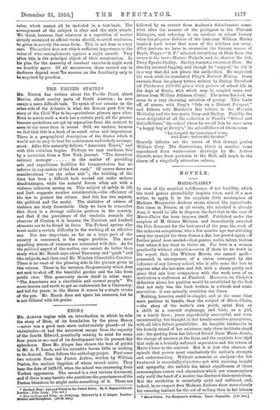THE UNITED STATES.*
ENOCIC has written about the Pacific Coast, about Mexico, about sundry parts of South America ; he now essays a more difficult task. To speak of our cousins on the other side of the Atlantic is what the Roman poet felt the story of the Civil War to be,—periculosae plenum opus aleae. Even to notice such a work has a certain peril, all the greater because quotations are apt by separation from the context to seem to say more than is meant. Still, we venture, because we feel that this is a book of no small value and importance. There is a geographical description of the States which it would not be easy to beat for conciseness and orderly arrange- ment. After this naturally follows "American Travel," and with this criticism begins. Perhaps we may condense this by a quotation from a New York journal. "The American railroad manager in the matter of providing safe and expeditious facilities for transportation has no inferior in any nation of the first rank." Of course there are considerations " on the other side" ; the building of the lines has been a difficult task carried out under serious disadvantages, while the natural forces often act with a violence unknown among us. This subject of safety to life and limb suggests another consideration,—the efficiency of the law to protect the citizen. And this has two aspects, the political and the social. The statistics of crimes of violence are truly formidable. Only we have to remember that there is a strange colluvies gentium in the country, and that if the prevalence of the vendetta reminds the observer of Corsica, it is because the Corsican and kindred elements are to be found in force. The Federal system also must make a certain difficulty in the working of an effective one. Not less important, as far as a large part of the country is concerned, is the negro problem. The most appalling stories of violence are connected with this. As for the political aspect of the matter, one cannot do better than study what Mr. Enock says about Tammany and "graft" and like subjects, and then read Mr. Winston Churchill's Coniston. There is no want of the pleasing side in the picture given in this volume. There is, for instance, the generosity which does not seek to shut off the beautiful garden and the like from public view. This generosity shows itself in other ways. "The Americans are a charitable and earnest people." We move heaven and earth to get an endowment for a University, and toil for years; in the States it comes by a single stroke of the pen. Mr. Enock does not spare his censures, but he is not illiberal with his praise.






































 Previous page
Previous page